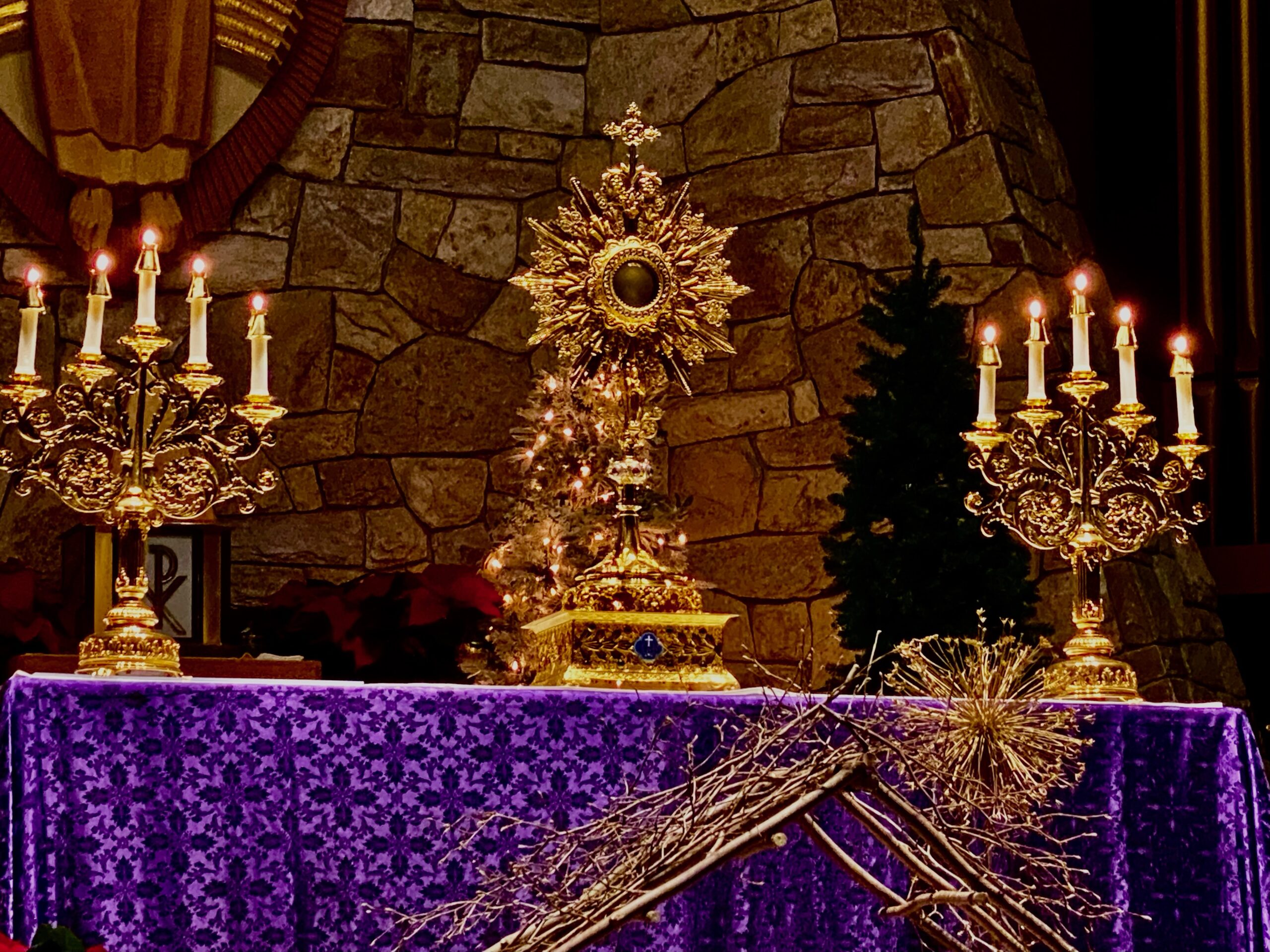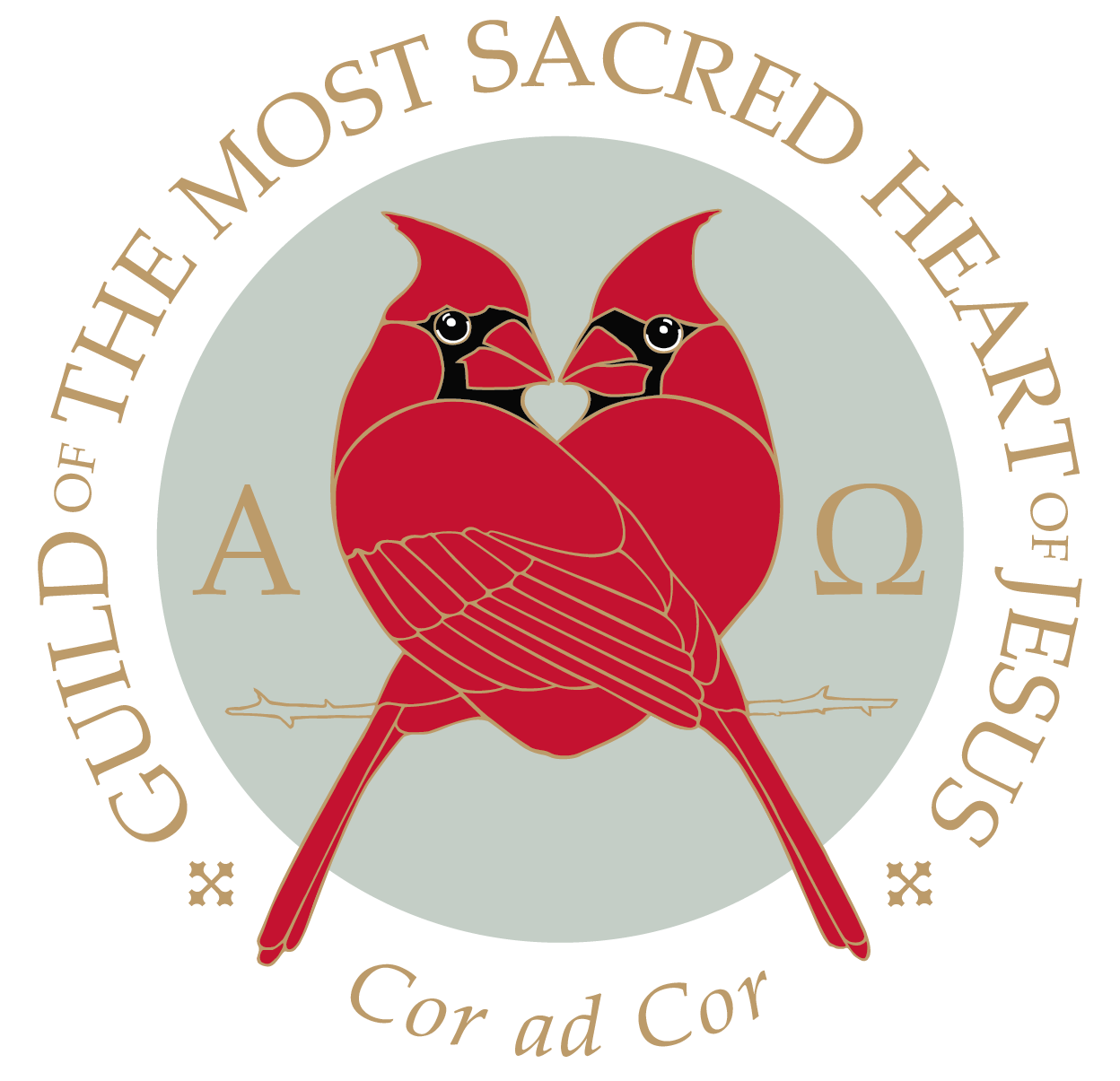
|
Mother Clare Matthias gave a powerful talk on the Eucharist at the December 17th ‘Heart to Heart’ Evening of Adoration at St. Jude’s Church in Monroe, CT. She spoke of the mystery of grace and the great gift of healing God is able to do in the lives of those who come to Him, and that healing is always present to us, because He is always present to us. The following is her talk from that evening.
It is a joy and a privilege to be here for this ‘Heart to Heart’ evening of Eucharistic prayer. My name is Mother Claire, a Franciscan Sister of the Renewal, and I am here with Sr. Maria Theresa, and our brothers, the Franciscan Friars of the Renewal, Fr. Malachy and Br. Damien. It’s an honor to be with you on this night of prayer, here in the midst of this very, very busy season of Advent – to pause and to come before the Lord in the Blessed Sacrament who will be exposed here on the Altar – to worship Him, to adore Him, and to offer Him our love.
I want to offer a few thoughts on this particular form of prayer that we’re going to be engaging in tonight. This adoration is extremely special and sacred, and yet mysterious. Candles are lit, and a very small white object is going to be placed in the monstrance, and there’ll be clearly veneration, even adoration. What is going on? And without explanation, without the depth of our Catholic faith, it sure looks odd, this mysterious worship that we’re offering.
Recently, we were in a mission to a Catholic School and speaking to preschoolers. We were trying to get across to these very, very young ones what the priest is doing at the altar. They are too young to be coming up for communion, but when they see their family and their parishioners all coming up to receive communion, they know something special is happening, and we wanted to make the connection between what’s happening at Mass and the Real Presence of God. We had the children repeat, “The host is Jesus, and Jesus is God.” Very, very simple.
The host is Jesus, and Jesus is God.
The host is Jesus, and Jesus is God.
The host is Jesus and Jesus is God.
That’s reason enough to gather around this altar tonight, isn’t it? Isn’t that reason enough?
In one week, we’ll celebrate Christmas. We’ll be remembering back to when the Word became flesh, and The Word was wrapped in swaddling clothes, laid in a manger for the adoration of Mary and Joseph, the shepherds, and a handful of people who were present that night to worship the Word made flesh. Over these years 2000, that number of five or six or seven worshipers that night has swelled to thousands, millions, billions. Because the host is Jesus and Jesus is God, we come here tonight to pray, to worship, to adore as we would at the manger if we were a shepherd, or a handmaid of Joseph and Mary on the journey.
I want to offer a few thoughts about what adoration is for us, and what adoration and worship of the Blessed Sacrament is for God. We come here tonight with all that we carry in our hearts and our minds, all the things that we’re burdened with in our families, in our own situations, in our own lives. We come here with our past. Sometimes that’s a source tremendous burden.
Adoration has the possibility of affecting your past. When you come into prayer, it’s a very common experience to feel distracted. Perhaps a memory will come up. Perhaps emotions will be stirred. Oftentimes, those things are related to something from the past. What could be happening, if we will allow it, is that Jesus- ‘the host is Jesus and Jesus is God’, – God is reaching and touching something in our past that needs to be healed, to be touched, to be forgiven.
That’s why confession is available tonight, because Adoration has the possibility of affecting our past, healing it, transforming it, changing it, and setting us free from the burdens of the past. We do not need to be shackled and burdened by the wounds, and the sins, and the failures of our past. No matter how severe or great they are, whether they’re our sins or the sins of someone else, the Lord means to set us free, and that can happen, can begin in the movement of the silence of Adoration if we will open our hearts to it. Adoration has the possibility of touching your past.
Adoration also has the possibility of touching your present moment, touching you right now. Very often when we come to prayer, religious included, we can be present physically and be absent mentally. Have you ever had that experience? Your body is sitting there, the rosary is moving through your fingers, but at the end of it you’re not even sure if you’ve prayed at all. We can be present physically and absent mentally, emotionally, and spiritually.
When we recollect ourselves, gather ourselves together – our heart, our mind, our thoughts, all the fragments that make up who we are – we can be present to Him as He is very present to us. In that union of presence, He has something to offer you, to give you, to administer to you, to bestow upon you. But we can only receive this as we are recollected and present to him, present to the one who is present to us. We refer to Jesus in the Eucharist as the Real Presence. The host is Jesus and Jesus is God.
Eucharistic Adoration can touch our past and heal it. The Eucharistic presence can gather us in and touch us in the core of who we are if we can be as present to Him as He is to us. And worshiping the Eucharist in adoration can also affect our future.
When we come before the Lord, He sees us as we are, and He sees us as we are meant to be. As the Father dreams of us, He sees our true identity. He sees us as Beloved, the Beloved of the Father and all the dreams that He has for us. He bestows upon us the grace to see ourselves as He sees us. Not as we see ourselves, not as the world sees us, not with the labels that have been placed upon us. But in Adoration, there is the possibility to begin to see ourselves as the Father sees us, so that we can live out our lives as the Father sees our lives, the dream that the Father has for us. Adoration has the possibility of touching the past, touching the present, and moving us into the future, which ultimately, we pray, is being with Him forever in Heaven. That’s the goal; that’s the destiny; that’s the dream. That’s the dream of the Father for each one of us.
But what is adoration to God? What does it mean to God that you have come here tonight to be with Him? Does He notice? Does He care? Absolutely, He has been whispering the invitation to you for the whole of your life, to draw closer, closer to Him. Does He see? He sees, and He rejoices. It is His invitation that draws you here. Why? He wants to touch your past. He wants to gather you up and bestow upon you graces in the present, and draw you into the future of eternity with Him forever.
But there’s also something that you and I can give to Him. This is a mystery that defies all reasonability, but it is true. We have the possibility in adoration of consoling Him in a way that stretches back into the past.
Think about the mysteries of our Lord’s life. Think about the suffering that our Lord endured in many different stages of His life. Choose the one that moves you the most. Perhaps it’s His Agony in the Garden, or when He was abandoned by the Apostles, or when He carried His cross. We can be present to those moments in our Lord’s life. In the mysterious world of prayer and the economy of grace that is timeless, and not linear in the way that we think, we can reach back. The love that we offer Jesus tonight can be consolation to Him in the Agony of the Garden.
The love, the attention, the worship that we offer Him tonight can be consolation for Him as He is on the cross. The devotion, the attention, the silence that you give to Jesus in the Eucharist tonight can be worship at the manger in silence. It’s a mysterious concept. It’s the timelessness of God – the love we offer here and now can be applied to the life of Christ. We can console Him by our love.
Not only does your presence mean something to Jesus in the past, it also means something in the present moment. It means right now, at this time, in this place, that with your free will, you chose Him tonight, very simply, Him, over all the other things that are out there, over all the other possibilities and all that the world has to offer. Tonight you choose Him right now in this present moment. It means something to Him, because He thirsts for your love. He thirsts for your love. He yearns. He died for your love. You quench the thirst of Jesus by offering Him your love in Eucharistic Adoration.
Lastly, what does Eucharistic Adoration mean to God for the future? There will come a time when all of this will end. What is the Father’s dream for the future? The desire of the Father is that we will be one, and that we’ll be with Him forever in Heaven. We begin to live that now. When we adore Jesus in the Holy Eucharist, Jesus takes us into His own Adoration of the Father, where we will be, hopefully, forever and ever for all eternity in Heaven.
Tonight as we enter into prayer, Jesus has something for you. He wants to bestow His love upon you. He wants to touch your past. He wants to touch your present. He wants to prepare you for your future. It matters to Him that you’re here as your love consoles Him in the past, you quench His thirst by loving Him right here, right now as He draws you into the center of the Divine love of the Trinity, a love that will last for eternity, Heart to Heart.
PRAY
